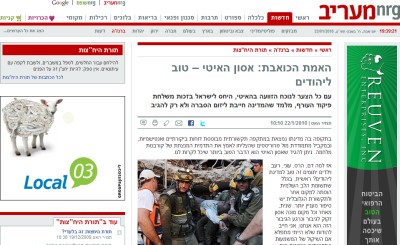‘The painful truth: Haiti’s disaster is good for the Jews’
I f I came up with a headline claiming the devastation in Haiti is “good for the Jews”, I could reasonably be accused of being anti-Semitic. But it’s not my headline. It comes from this report on a site run by Israel’s popular Hebrew daily, Maariv.
f I came up with a headline claiming the devastation in Haiti is “good for the Jews”, I could reasonably be accused of being anti-Semitic. But it’s not my headline. It comes from this report on a site run by Israel’s popular Hebrew daily, Maariv.
Every disaster needs a hero, the report says, and the heroes in Haiti are the Israelis.
The message that Israel is saving Haiti was likewise captured in an editorial cartoon in Yediot Aharonot which shows American soldiers digging for earthquake survivors. A voice from beneath the rubble calls out, “Would you mind checking to see if the Israelis are available?”
Bnei Akiva, the largest religious Zionist youth movement in the world, in partnership with Latet, an Israeli humanitarian aid organization, launched a Haiti appeal saying: “We are not only helping Haitians with their tragedy, but uniting the Jewish world and demonstrating the Jewish values of the State of Israel. We believe that it is a Jewish duty to help the people of Haiti. As the representative of the Jewish people, the State of Israel is leading the relief effort.”
An Associated Press article I linked to yesterday describing the exodus of Haitians fleeing from the ruins of Port-au-Prince, strangely was subsequently replaced by a report describing the rescue of a 22-year-old man by an Israeli search team 10 days after the earthquake leveled much of the capital.
In Haaretz, Bradley Burston writes:
Over the past week, the work of the Israeli medical team has become a kind of Rorschach for how people view Israel and Israelis. Most of the comment, it must be said, is supportive. Even on the part of those who cast the humanitarian misery in Gaza in contrast.
But for a shocking number of others, the bottom line is simple: Israel, and Israelis, can do no right.
In its most extreme form, there are those who have accused Israel of using the Haiti catastrophe as a new reservoir for harvesting organs.
But even many of those who shun blood libels, have seized on the Haiti mission to bash Israel, revealing in many cases a hatred – and a bigotry – that borders on the visceral.
Would Burston lump me in with the anti-Israel commentators? Maybe.
Do I think the Israeli doctors, nurses and rescue teams now working in Haiti are all toiling away purely in the service of Israel’s international image? I doubt it. I would expect that for most of these individuals, their response is like that of most of the other foreigners now providing relief to Haitians: it is above all a human response to human suffering.
Is there such a thing as an Israeli response or a Jewish response or an American response to human suffering? If so, it is laced with vanity.
To say this is what we do because this is who we are is to preen oneself in front of a mirror of self-praise. It is undignified. It spies a reward in someone else’s loss.
In this mirror, Israel now sees an image of itself as a big-hearted nation admired around the world for its humanitarian efforts in Haiti. But the self-satisfaction will be short-lived. Before long this glimmer of goodwill will once again be overshadowed by the enduring reality that in the minds of most Israelis the suffering of others seems just as likely to provoke callous indifference as it does an open heart.
The big Israeli heart shrivels at the sight of a Palestinian.
As Larry Derfner wrote in the Jerusalem Post:
… the IDF field hospital in Haiti is a reflection of something very deep in the national character.
But so is everything that’s summed up in the name “Gaza.” It’s the Haiti side of Israel that makes the Gaza side so inexpressibly tragic. And more and more, the Haiti part of the national character has been dwarfed by the Gaza part.
Gaza, too, is a matter of life and death – not just for the people who were trapped in the rubble there not long ago, but for Israel. When will this big-hearted nation stop being heartless to the people in Gaza?

